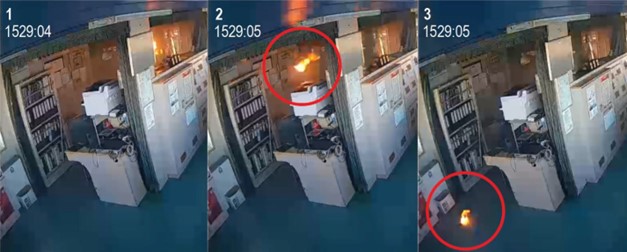NTSB highlights potential fire risks of lithium-ion batteries
WASHINGTON (Nov. 9, 2023) — The thermal runaway of a cell within a handheld radio’s lithium-ion battery led to a fire on an oil tanker last year while docked in Baton Rouge, Louisiana, the National Transportation Safety Board said Thursday. The fire resulted in $3 million in damage to the vessel.
The oil tanker S-Trust was docked at the Genesis Port Allen Terminal on
Nov. 13, 2022, when a fire started on the bridge. The fire was caused by one of the cells in a lithium-ion battery for an ultra-high-frequency handheld radio exploding. The batteries and chargers for the handheld radios were located on the communications table on the bridge. The vessel’s crew extinguished the fire. The S-Trust’s navigation, communication and alarm systems were damaged beyond use. No injuries were reported.

Photos from the bridge closed-circuit camera showing (1) a second explosion occurs, (2) an object is propelled on fire into the air (circled), and (3) the object, still on fire, landing on the floor. (Source: Stalwart Management Ltd)
Lithium-ion battery cell explosions are typically caused by a thermal runaway, a chemical reaction that can cause the cell to ignite and explode. A lithium-ion battery cell can spontaneously experience a thermal runaway if damaged, shorted, overheated, defective or overcharged.
Crews can help to prevent thermal runaways and ensuing fires by:
- Following manufacturers’ instructions for the care and maintenance of lithium-ion batteries;
- Properly disposing of damaged batteries;
- Avoiding unsupervised charging; and
- Keeping batteries and chargers away from heat sources and flammable materials.
“Companies should ensure that lithium-ion batteries and devices that use lithium-ion battery packs are certified by Underwriters Laboratory or another recognized organization,” the report said.
If a lithium-ion battery fire occurs, crews can attempt to extinguish the fire with water, foam, CO2, or other dry chemical or powdered agents designed for use on Class A (combustible) fires. If the battery fire cannot be extinguished, personnel should attempt to allow the pack to burn in a controlled manner, including by watching for nearby cells that may also experience thermal runaway and extinguishing other combustibles that may catch on fire.
Marine Investigation Report 23-23 is available online.
To report an incident/accident or if you are a public safety agency, please call 1-844-373-9922 or 202-314-6290 to speak to a Watch Officer at the NTSB Response Operations Center (ROC) in Washington, DC (24/7).